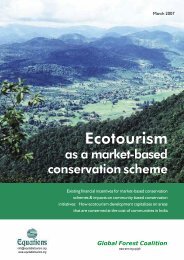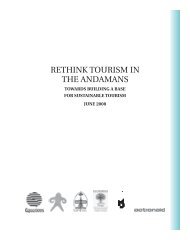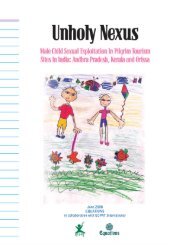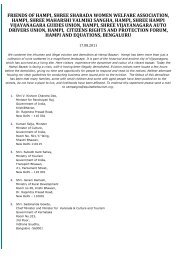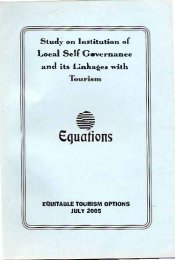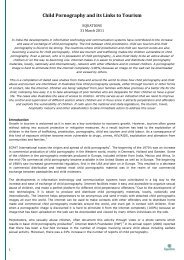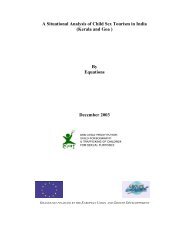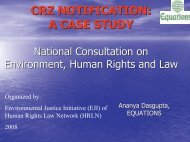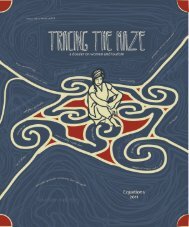Claiming the Right to Say No-30 Nov 09-EQUATIONS - Equitable ...
Claiming the Right to Say No-30 Nov 09-EQUATIONS - Equitable ...
Claiming the Right to Say No-30 Nov 09-EQUATIONS - Equitable ...
Create successful ePaper yourself
Turn your PDF publications into a flip-book with our unique Google optimized e-Paper software.
Tourism in Goa: A Narrative Construction of Hosts and Visi<strong>to</strong>rs<br />
we can see how a <strong>to</strong>urism that is build solely on economic principles as a<br />
chief bench mark of development can destroy <strong>the</strong> very idea of Goa and<br />
Goans. The regional plan 2011 was indeed a good prescription for such<br />
destruction. Hence, a <strong>to</strong>urism that is exclusionary of <strong>the</strong> interest of native<br />
community cannot be sustainable.<br />
But we need also <strong>the</strong> enlightening of <strong>the</strong> natives and lead <strong>the</strong>m <strong>to</strong> move<br />
out of Pla<strong>to</strong>nic cave of <strong>to</strong>urism and so that we are saved from killing <strong>the</strong><br />
hen that lays a golden egg in our greed. This is not a simple process. We<br />
need <strong>to</strong> engage in producing a discourse that will manifest <strong>the</strong> disfigured<br />
face of <strong>to</strong>urism and compel all <strong>the</strong> stake holders <strong>to</strong> refigure and rearticulate<br />
<strong>the</strong> narrative of Goa that is both sustainable and participative. To achieve<br />
this goal we need <strong>to</strong> establish many counter-publics, groups that openly<br />
critique and work <strong>to</strong> produce and alternate narrative that will save Goa<br />
and Goans. Only an eruption of such little narratives can build in<strong>to</strong> a<br />
volcano that will de-narrattivize and thus de-rail <strong>the</strong> present form of <strong>to</strong>urism.<br />
The church and o<strong>the</strong>r religious authorities, human right activists, <strong>to</strong>urism<br />
activists, researchers and o<strong>the</strong>rs have a great task <strong>to</strong> perform. The<br />
imperative <strong>to</strong> respond <strong>to</strong> <strong>the</strong> scenario of <strong>to</strong>urism cannot be left unheeded<br />
<strong>to</strong>. This imperative challenges us <strong>to</strong> call of <strong>the</strong> o<strong>the</strong>r in <strong>the</strong> Levinasian<br />
way. It is a challenge <strong>to</strong> move from <strong>the</strong> on<strong>to</strong>logical said (narratives of<br />
Goa) <strong>to</strong> <strong>the</strong> ethical saying.<br />
Conclusion<br />
Our study attempts <strong>to</strong> understand <strong>the</strong> narrative implications on <strong>the</strong> hosts<br />
and visi<strong>to</strong>rs in Goa. The present narrative construction of our state can<br />
lead us <strong>to</strong> a collective disaster. Hence, a new sustainable and nativecommunity-centred<br />
<strong>to</strong>urism is a dire need of <strong>the</strong> hour.<br />
9



